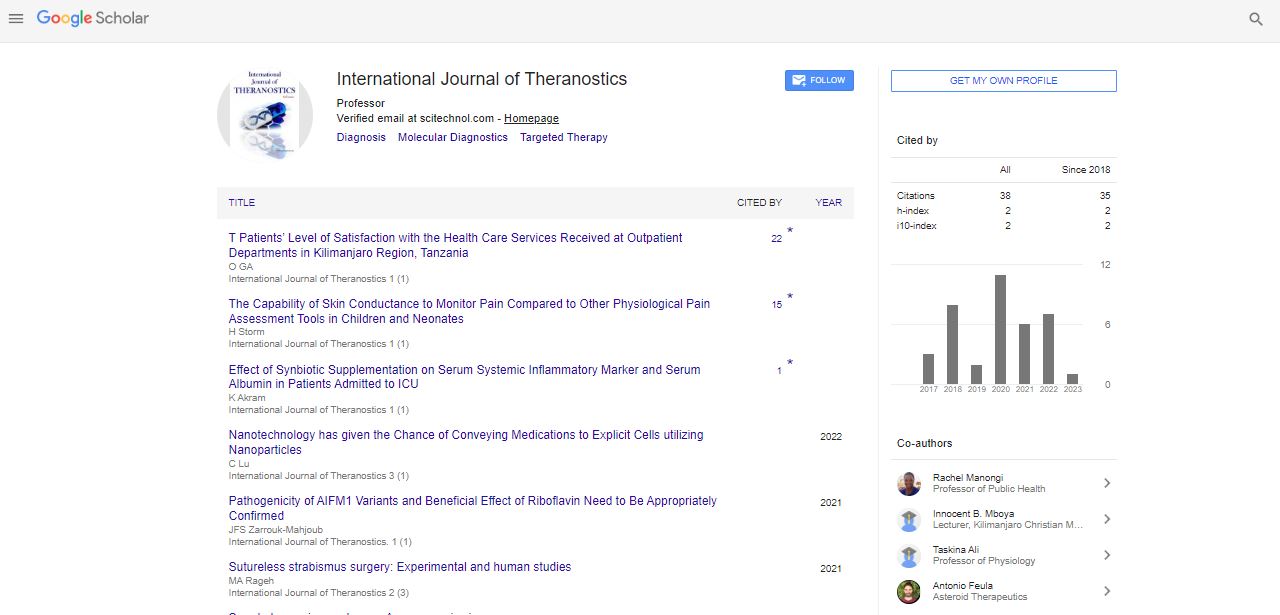Perspective, Int J Theranostic Vol: 12 Issue: 1
An Overview on Personalized Medicine: Its Benefits and Risk Factors
Pavan Kumar*
Department of Pharmaceutics, National Institute of Pharmaceutical Education and Research, Bihar, India
*Corresponding Author: Pavan Kumar
Department of Pharmaceutics, National
Institute of Pharmaceutical Education and Research, Bihar, India
E-mail: kumarpav@an.gmail.com
Received date: 03-Feb-2023, Manuscript No. IJT-23-95549;
Editor assigned date: 06-Feb-2023, PreQC No. IJT-23-95549 (PQ);
Reviewed date: 20-Feb-2023, QC No IJT-23-95549;
Revised date: 27-Feb-2023, Manuscript No. IJT-23-95549 (R);
Published date: 07-Mar-2023 DOI: 10.4172/IJT.100123.
Citation: Kumar P (2023) An Overview on Personalized Medicine : Its Benefits and Risk Factors. Int J Theranostic 12:1.
Keywords: Diagnosis, Image-guided Therapy, Molecular Diagnostics
Description
Personalized medicine, also known as precision medicine, is a medical approach that tailors treatments and therapies to individual patients based on their unique genetic makeup, environment, and lifestyle factors. The goal of personalized medicine is to improve patient outcomes by providing targeted and more effective treatments, reducing adverse reactions and unnecessary treatments, and ultimately improving the quality of life for patients.
The advent of personalized medicine has been made possible by advancements in genetics and genomics, which have made it possible to sequence and analyze an individual's genetic code rapidly and affordably. With this information, doctors can make more informed decisions about which treatments are likely to be most effective for a patient and which treatments may be more likely to cause side effects or other complications.
One of the most significant benefits of personalized medicine is the ability to provide more effective and targeted treatments for diseases like cancer. Traditionally, cancer treatment has been based on the location of the tumor and the stage of the disease. However, with personalized medicine, doctors can analyze a patient's genetic profile and identify specific genetic mutations that may be driving the growth of the tumor. This information can be used to develop more targeted therapies that are designed to attack the specific mutations responsible for the cancer's growth, improving the likelihood of success and reducing the risk of side effects.
In addition to cancer treatment, personalized medicine has the potential to transform the treatment of other diseases as well. For example, genetic testing can be used to identify individuals who are at increased risk of developing certain conditions, such as heart disease or Alzheimer's disease. With this information, doctors can develop personalized prevention strategies that are tailored to an individual's specific genetic risk factors and lifestyle.
Another significant benefit of personalized medicine is the potential to reduce healthcare costs. By tailoring treatments and therapies to individual patients, doctors can avoid prescribing medications or treatments that are unlikely to be effective or that may cause side effects or other complications. This can lead to significant cost savings for patients and healthcare providers, as well as improving the overall quality of care.
However, personalized medicine also faces some challenges and limitations. One of the most significant challenges is the availability of genetic testing and other diagnostic tools. While the cost of genetic testing has decreased significantly in recent years, it is still not accessible to all patients, and some health insurance plans may not cover the cost of genetic testing or other personalized medicine treatments.
Another challenge is the need for more extensive data sharing and collaboration among healthcare providers and researchers. Personalized medicine relies on vast amounts of data, including genetic information, medical histories, and lifestyle factors. However, there are still significant barriers to sharing this data, including concerns about privacy and data security.
There is also a risk of over-reliance on genetic information and neglecting other important factors that may influence a patient's health outcomes. While genetics play an important role in many diseases, other factors such as lifestyle and environmental factors can also significantly impact health outcomes.
 Spanish
Spanish  Chinese
Chinese  Russian
Russian  German
German  French
French  Japanese
Japanese  Portuguese
Portuguese  Hindi
Hindi 